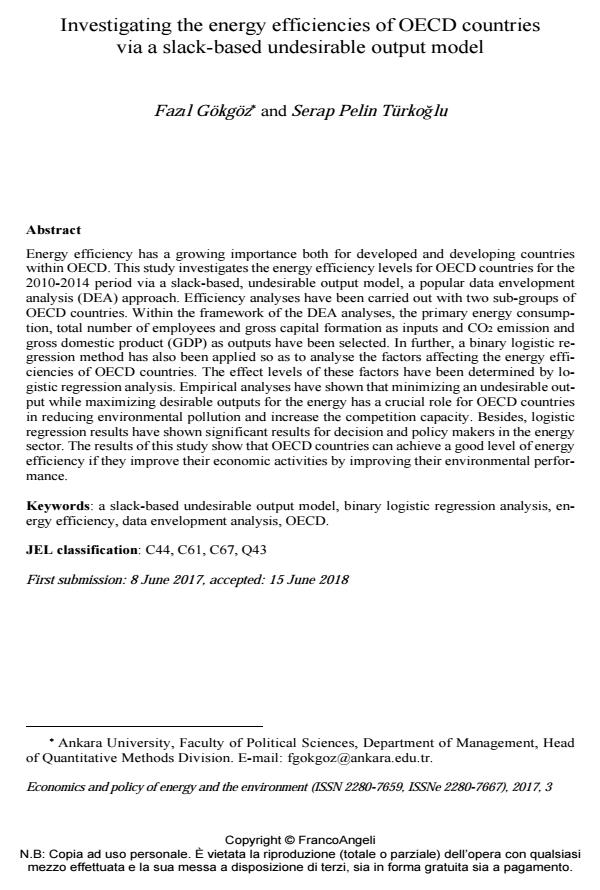Investigating the energy efficiencies of OECD countries via a slack-based undesirable output model
Titolo Rivista ECONOMICS AND POLICY OF ENERGY AND THE ENVIRONMENT
Autori/Curatori Fazil Gokgoz, Serap Pelin Turkoglu
Anno di pubblicazione 2018 Fascicolo 2017/3
Lingua Italiano Numero pagine 22 P. 73-94 Dimensione file 249 KB
DOI 10.3280/EFE2017-003005
Il DOI è il codice a barre della proprietà intellettuale: per saperne di più
clicca qui
Qui sotto puoi vedere in anteprima la prima pagina di questo articolo.
Se questo articolo ti interessa, lo puoi acquistare (e scaricare in formato pdf) seguendo le facili indicazioni per acquistare il download credit. Acquista Download Credits per scaricare questo Articolo in formato PDF

FrancoAngeli è membro della Publishers International Linking Association, Inc (PILA), associazione indipendente e non profit per facilitare (attraverso i servizi tecnologici implementati da CrossRef.org) l’accesso degli studiosi ai contenuti digitali nelle pubblicazioni professionali e scientifiche.
Energy efficiency has a growing importance both for developed and developing countries within OECD. This study investigates the energy efficiency levels for OECD countries for the 2010-2014 period via a slack-based, undesirable output model, a popular data envelopment analysis (DEA) approach. Efficiency analyses have been carried out with two sub-groups of OECD countries. Within the framework of the DEA analyses, the primary energy consumption, total number of employees and gross capital formation as inputs and CO2 emission and gross domestic product (GDP) as outputs have been selected. In further, a binary logistic regression method has also been applied so as to analyse the factors affecting the energy efficiencies of OECD countries. The effect levels of these factors have been determined by logistic regression analysis. Empirical analyses have shown that minimizing an undesirable output while maximizing desirable outputs for the energy has a crucial role for OECD countries in reducing environmental pollution and increase the competition capacity. Besides, logistic regression results have shown significant results for decision and policy makers in the energy sector. The results of this study show that OECD countries can achieve a good level of energy efficiency if they improve their economic activities by improving their environmental performance.
Parole chiave:A slack-based undesirable output model, binary logistic regression analysis, energy efficiency, data envelopment analysis, OECD.
Jel codes:C44, C61, C67, Q43
- Technical Efficiency and Productivity Change in the European Union with Undesirable Output Considered Djula Borozan, in Energies /2021 pp.4937
DOI: 10.3390/en14164937 - Role of climate fund raising under fiscal balance on climate change mitigation: an analysis from Pareto optimality Jie Ding, Ying Wang, Siqi Wang, Muhammad Mohsin, in Environmental Science and Pollution Research /2022 pp.19047
DOI: 10.1007/s11356-022-22620-w
Fazil Gokgoz, Serap Pelin Turkoglu, Investigating the energy efficiencies of OECD countries via a slack-based undesirable output model in "ECONOMICS AND POLICY OF ENERGY AND THE ENVIRONMENT" 3/2017, pp 73-94, DOI: 10.3280/EFE2017-003005